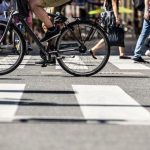In yet another example of the cost of the pandemic, a new study finds there were significant increases in bicycle- and gun-related injuries during coronavirus lockdowns in the United States, but a decrease in traffic injuries.
Researchers analyzed data on more than 27,600 trauma cases at four Level I trauma centers in Orange County, Calif.; Portland, Ore.; Tulsa, Okla., and Miami between 2019 and 2020.
Overall, there was a 100% spike in bicycle-related injuries and a 23.5% surge in gun-related injuries during that time, but a 12.7% decline in traffic injuries.
In Orange County, gunshot wounds increased 55%, bicycle injuries increased nearly 31%, and traffic injuries fell 10.2%. In Portland, gunshot wounds increased 48.4%, bicycle injuries rose 296.2%, and traffic injuries fell 21.5%.
In Tulsa, gunshot wounds increased 22.2%, traffic injuries declined 5.1% percent, and bicycle injuries rose 18.2%. In Miami, gunshot wounds increased nearly 21% percent, traffic injuries decreased 14.5%, and bicycle injuries increased 2.6%.
The study was presented last week at the virtual annual meeting of the American College of Surgeons.
The researchers said the increase in gunshot wounds was unexpected.
“We thought we might see an uptick in the percentage of [gunshot wounds] given the percentages of [traffic injuries] were down and the percentages might need to go up to cover that mechanism of injury; but we were mildly surprised that not only did the percentage go up, but the actual raw numbers of gun injuries went up,” said study senior author Dr. Cristobal Barrios Jr., a health sciences clinical professor in surgery and assistant dean of admissions at the University of California, Irvine.
“That was true across all the trauma centers that contributed data to the study,” he said in a meeting news release.
On the other hand, the trends in bicycle and traffic injuries were understandable.
“People weren’t going anywhere for any real large distances because there was nowhere to go during lockdown, but maybe they were utilizing their bicycles to get around a little bit, to get some exercise, and to get out of the house,” Barrios explained.
The findings may help health care providers and policymakers be better prepared for possible future pandemic-related lockdowns.
“We did this research to shed light on what to expect during any possible next lockdown for a pandemic and where to potentially put resources for clinicians in terms of what types of injuries might present and that might increase or decrease,” Barrios said.
“Another big contributor would be to have more green spaces in these communities — spaces where people can go out and exercise in a safe environment,” said study presenter Leonardo Alaniz, a third-year medical student at UC Irvine. “That would also play a huge role in preserving the mental health of our communities.”
Research presented at meetings should be considered preliminary until published in a peer-reviewed journal.
More information
The National Safety Council offers advice on bike safety.
SOURCE: American College of Surgeons, news release, Oct. 20, 2021
Copyright © 2026 HealthDay. All rights reserved.
















